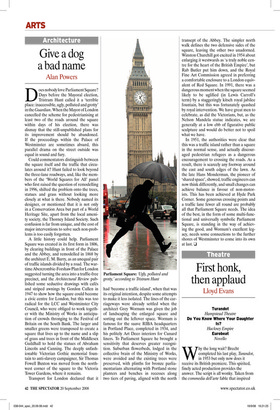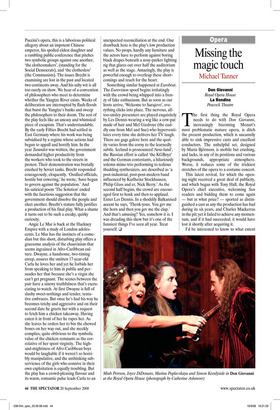First honk, then applaud
Lloyd Evans
Turandot Hampstead Theatre Do You Know Where Your Daughter Is? Hackney Empire Eurobeat Novello
Why the long wait? Brecht completed his last play, Turandot, in 1953 but only now does it receive its British premiere. This spirited, finely acted production provides the answer. The script is all wonky. Taken from the commedia dell’arte fable that inspired Puccini’s opera, this is a laborious political allegory about an impotent Chinese emperor, his spoiled eldest daughter and a rambling public conference that pitches two symbolic groups against one another, ‘the clothesmakers’, (standing for the Social Democrats), and ‘the clothesless’ (the Communists). The issues Brecht is examining are lost in the past and located two continents away. And his salty wit is all too rarely on show. We hear of a convention of philosophers who meet to determine whether the Yangtze River exists. Weeks of deliberation are interrupted by flash-floods that burst the Yangtze’s banks and sweep the philosophers to their doom. The rest of the play feels like an uneasy and whimsical piece of escapism. That’s understandable. By the early Fifties Brecht had settled in East Germany where his work was being subsidised by a regime whose actions had begun to appall and horrify him. In the year Turandot was written, the government demanded higher productivity from the workers who took to the streets in protest. Their demonstration was brutally crushed by Soviet tanks. Brecht responded courageously, eloquently. ‘Ossified officials, hostile but cowering,’ he wrote, ‘have begun to govern against the population.’ And his satirical poem ‘The Solution’ ended with the facetious suggestion that the government should dissolve the people and elect another. Brecht’s stature fully justifies a production of his final play. What a shame it turns out to be such a creaky, quirky curiosity.
Angie Le Mar is back at the Hackney Empire with a study of London adolescents. Le Mar has the instincts of a comedian but this short, disturbing play offers a gruesome analysis of the chauvinism that seems ingrained in Afro-Caribbean culture. Dwayne, a handsome, two-timing creep, assures the smitten 17-year-old Carla he loves her and yet he forbids her from speaking to him in public and persuades her that because she’s a virgin she can’t get pregnant. The scenes between the pair have a sinewy truthfulness that’s excruciating to watch. At first Dwayne is full of slushy sweet-nothings and tender, tentative embraces. But once he’s had his way he becomes tetchy and aggressive and on their second date he greets her with a request to fetch him a chicken takeaway. Having eaten it in front of her he rapes her. As she leaves he orders her to bin the chewed bones on her way out, and she meekly complies, quite oblivious to the symbolic value of the chicken remnants as the correlative of her spent virginity. The highand-mightiness of Afro-Caribbean boys would be laughable if it weren’t so horribly manipulative, and the unthinking subservience of the girls who connive in their own exploitation is equally troubling. But the play has a crowd-pleasing flavour and its warm, romantic pulse leads Carla to an unexpected reconciliation at the end. One drawback here is the play’s low production values. No props, hardly any furniture and the actors have to perform against boring black drapes beneath a nosy-parker lighting rig that glares out over half the auditorium as well as the stage. Amazingly, the play is powerful enough to overleap these shortcomings and reach for the heart.
Something similar happened at Eurobeat. The Eurovision spoof begins irritatingly with the crowd being whipped into a frenzy of fake enthusiasm. But as soon as our hosts arrive, ‘Welcome to Sarajevo’, everything clicks into place. The nervous, alltoo-smiley presenters are played exquisitely by Les Dennis wearing a wig like a cow-pat made of hair and Mel Giedroyc (the cuddly one from Mel and Sue) who hyperventilates every time she delivers her TV laugh. There are gags galore here and the quality varies from the corny to the learnedly subtle. Iceland is pronounced ‘Arse-land’, the Russian effort is called ‘the KGBoyz’ and the German contestants, a hilariously solemn mime-trio performing to tedious thudding synthesizers, are described as ‘a post-industrial, post-post-modern band influenced by Karlheinz Stockhausen, Philip Glass and er, Nick Berry.’ As the second half begins, the crowd are encouraged first to honk and then to applaud. Enter Les Dennis. In a shoddily Balkanised accent he says, ‘Thenk-yous. You gev me the horn and then you gev me the clap.’ And that’s amusing? Yes, somehow it is. I was dreading this show but it’s one of the funniest things I’ve seen all year. Treat yourself. ❑











































































 Previous page
Previous page